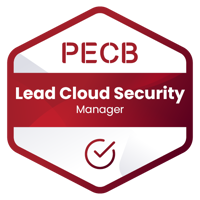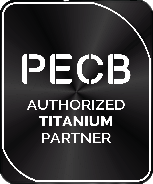Certified Lead Cloud Security Manager
From £2,745 + VAT
Book online today or, if you need help choosing the right course or would like to discuss business discounts, call us on 0113 220 7150.
Overview
The growing number of organizations that support remote work has increased the use of cloud computing services, which has, in turn, increased the demand for a secure cloud infrastructure proportionally.
This training course is designed to help participants acquire the knowledge and skills needed to support an organization in effectively
planning, implementing, managing, monitoring, and maintaining a cloud security program based on ISO/IEC 27017 and ISO/IEC 27018.
It provides a comprehensive elaboration of cloud computing concepts and principles, cloud computing security risk management, cloud specific controls, cloud security incident management, and cloud security testing.
The training course is followed by the certification exam. If you successfully pass it, you can apply for a “PECB Certified Lead Cloud Security
Manager” credential. A PECB Lead Cloud Security Manager Certificate demonstrates your ability and competencies to manage a cloud
security program based on best practices.
Day 1: Introduction to ISO/IEC 27017 and ISO/IEC 27018 and the initiation of a cloud security program
Day 2: Cloud computing security risk management and cloud-specific controls
Day 3: Documented information management and cloud security awareness and training
Day 4: Cloud security incident management, testing, monitoring, and continual improvement
General information
- Certification fees are included in the exam price.
- Participants will be provided with the training course material containing over 500 pages of explanatory information, examples, best practices, exercises, and quizzes.
- An attendance record worth 31 CPD (Continuing Professional Development) credits will be issued to the participants who have attended the training course.
- In case candidates fail the exam, they can retake it within 12 months of the initial attempt for free.
Prerequisites
The main requirement for participating in this training course is having a fundamental understanding of ISO/IEC 27017 and ISO/IEC 27018 and a general knowledge of cloud computing concepts.
Who should attend?
- Cloud security and information security professionals seeking to manage a cloud security program
- Managers or consultants seeking to master cloud security best practices
- Individuals responsible for maintaining and managing a cloud security program
- Technical experts seeking to enhance their cloud security knowledge
- Cloud security expert advisors
Delegates will learn how to
- Gain a comprehensive understanding of the concepts, approaches, methods, and techniques used for the implementation and effective management of a cloud security program
- Acknowledge the correlation between ISO/IEC 27017, ISO/IEC 27018, and other standards and regulatory frameworks
- Gain the ability to interpret the guidelines of ISO/IEC 27017 and ISO/IEC 27018 in the specific context of an organization
- Develop the necessary knowledge and competence to support an organization in effectively planning, implementing, managing, monitoring, and maintaining a cloud security program
- Acquire the practical knowledge to advise an organization in managing a cloud security program by following best practices
Outline
Day 1: Introduction to ISO/IEC 27017 and ISO/IEC 27018 and the initiation of a cloud security program
Day 2: Cloud computing security risk management and cloud-specific controls
Day 3: Documented information management and cloud security awareness and training
Day 4: Cloud security incident management, testing, monitoring, and continual improvement
Day 5: Certification exam
The “PECB Certified Lead Cloud Security Manager” exam meets the requirements of the PECB Examination and Certification Program (ECP). It covers the following competency domains:
Domain 1: Fundamental principles and concepts of cloud computing
Domain 2: Information security policy for cloud computing and documented information management
Domain 3: Cloud computing security risk management
Domain 4: Cloud-specific controls based on ISO/IEC 27017 and ISO/IEC 27018 and best practices
Domain 5: Cloud security awareness, training, roles, and responsibilities
Domain 6: Cloud security incident management
Domain 7: Cloud security testing, monitoring, and continual improvement
For specific information about exam type, languages available, and other details, please visit the List of PECB Exams and the Examination Rules and Policies.
Certification

Why choose QA
- Award-winning training, top NPS scores
- Nearly 300,000 learners in 2020
- Our training experts are industry leaders
- Read more about QA

QA is an approved training provider for ELCAS, proud to support service leavers in their transition into the tech industry. Learn more about Elcas approved training here.
Related courses
Cyber Security learning paths
Want to boost your career in cyber security? Click on the roles below to see QA's learning pathways, specially designed to give you the skills to succeed.
Cyber Security for Cloud learning paths
Cloud Security learning paths
Want to boost your career in Cloud Security? View QA's learning pathway below, specially designed to give you the skills to succeed.

Frequently asked questions
How can I create an account on myQA.com?
There are a number of ways to create an account. If you are a self-funder, simply select the "Create account" option on the login page.
If you have been booked onto a course by your company, you will receive a confirmation email. From this email, select "Sign into myQA" and you will be taken to the "Create account" page. Complete all of the details and select "Create account".
If you have the booking number you can also go here and select the "I have a booking number" option. Enter the booking reference and your surname. If the details match, you will be taken to the "Create account" page from where you can enter your details and confirm your account.
Find more answers to frequently asked questions in our FAQs: Bookings & Cancellations page.
How do QA’s virtual classroom courses work?
Our virtual classroom courses allow you to access award-winning classroom training, without leaving your home or office. Our learning professionals are specially trained on how to interact with remote attendees and our remote labs ensure all participants can take part in hands-on exercises wherever they are.
We use the WebEx video conferencing platform by Cisco. Before you book, check that you meet the WebEx system requirements and run a test meeting to ensure the software is compatible with your firewall settings. If it doesn’t work, try adjusting your settings or contact your IT department about permitting the website.
How do QA’s online courses work?
QA online courses, also commonly known as distance learning courses or elearning courses, take the form of interactive software designed for individual learning, but you will also have access to full support from our subject-matter experts for the duration of your course. When you book a QA online learning course you will receive immediate access to it through our e-learning platform and you can start to learn straight away, from any compatible device. Access to the online learning platform is valid for one year from the booking date.
All courses are built around case studies and presented in an engaging format, which includes storytelling elements, video, audio and humour. Every case study is supported by sample documents and a collection of Knowledge Nuggets that provide more in-depth detail on the wider processes.
When will I receive my joining instructions?
Joining instructions for QA courses are sent two weeks prior to the course start date, or immediately if the booking is confirmed within this timeframe. For course bookings made via QA but delivered by a third-party supplier, joining instructions are sent to attendees prior to the training course, but timescales vary depending on each supplier’s terms. Read more FAQs.
When will I receive my certificate?
Certificates of Achievement are issued at the end the course, either as a hard copy or via email. Read more here.

